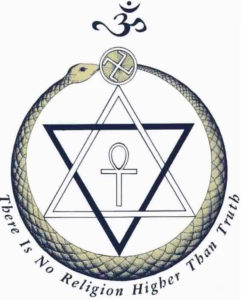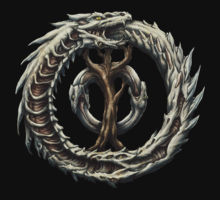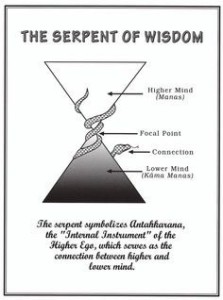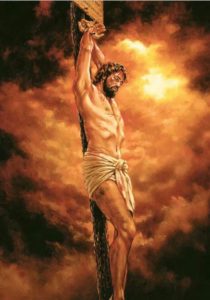
Ouroboros: Ancient Symbol of Truth
Unifying Mankind into one Body of Believers
The ouroboros is the ancient symbol of a snake, dragon, forming a circle by clasping its tail in its mouth. As the above graphic depicts, this symbol depicts all mankind unifying into a single body of belief through the commonalities of the various world religions that rely on works of the flesh for proof of man’s goodness and righteousness. It is the symbol of Gnosticism, the new faith of the coming False Prophet that will unite all mankind into receiving the prophet of the dragon, the Antichrist.
Now, with those sweeping words I probably lost most of my readers who think stories of the Antichrist and False Prophet belong up with Snow White and the boogey man. Well, as usually depicted this would be a fair assessment. The popularization of these two characters have been more fantasy than biblical. However, let us take a moment to analyze their most popular and enduring symbol, the ouroboros and learn what truths it can teach us when compared to biblical truths.

The One Dragon, Satan, with Two Snakes:
Man and Woman Around the Tree
Bible states that Satan, the Dragon, approached Woman questioning her about her understanding of God’s commandment: Do not eat of the Tree of Knowledge (Re 12:9). He persuaded her to view God’s word in a new light: God did not want mankind to be as knowledgable as Himself making knowledge the pathway to godship; a view still held today (Ge 3:1-6). Woman and man ate of the tree, broke God’s commandment, instantly become sin as depicted by the two snakes (Ge 3:7-13). Their sinfulness was evidenced by their guilt; i.e., hiding their nakedness with fig leaves and then hiding from God. When confronted by God each blamed another: man blamed woman who blamed Satan. In other words, the two snakes devouring each other around the tree rather than the unity they had enjoyed as one flesh in God’s grace (Ge 2:23-25).
Now forward a few thousand years into the future to the book of Romans. Paul is writing to the Church at Rome, not the Roman Catholic one which did not exist for a few hundred years. He wishes to insure they are basing their beliefs on biblical truths {New Testament was being written so their Bible was the Old Testament}. He was writing primarily to Gentiles so he based his teachings on the Bible without confusing these Gentiles with specific Old Testament references they may or may not understand. Instead, Paul uses words from the Old Testament that conveys the truths they need to be strong in the faith. He begins with the fact that the person of true faith will live faithfully out of the righteousness of God; no other source (Ro 1:16-17). This concept references Habakkuk who questioned God and the waited for God to correct him for his lack of knowledge of God’s ways (Hab 2:1-4). Thus, the power of God is His Gospel {Bible} and not apparent or seemingly intuitive truths.
Why? Because the mind of man at the fall became spiritually dead and all who were conceived were given this spiritually dead sin nature (Ps 51:5). Since the sin nature is non-empirical, what is our proof of its universal existence? The ungodliness and unrighteousness of all people. Ungodliness {ἀσέβεια} is one who is without reverence of God. This is manifested in unrighteousness {ἀδικία}. This unrighteousness, the words and deeds, reveals the nature of the sinner: ungodliness. Ungodliness also carries the connotation of one who not only rejects God but also separates him, or her, self from God. When confronted with the Truth of God the ungodliness seeks suppression of that truth and all who represent that truth; i.e., Cain killing Abel (Ge 4:3-8). When God rejected Cain’s {Strong one} offering but accepted Abel’s {Worthless one}, Cain flew into a rage. God confronted him telling Cain he must overcome his sin or be ruled by it; he was ruled by his sin. The flesh cannot control sin of its own accord evidenced by Man and Woman being defeated by their flesh and sinning. Cain’s only option was to appeal to God for mercy to be as Abel; which he was wroth to do. Thus, Cain suppressed the truth lived by Abel by killing Abel. this revealed his ungodliness which God warned him was in him.
God does give us any witness today of His truths! Well, yes He does. God’s nature exhibits His truths; specifically His morality as contained in the Ten Words (Ex 20:1-17). We are made in His image; thus, though we are sinners we still have this image of His moral code in our nature (Ge 1:27). This is why universally and historically societies have had the same basic moral codes: do not kill, steal, commit adultery, lie, etc. Modern man steals this morality from the Bible while denying the God that brought the code. Man’s failure to ever keep the moral code, Ten Words, shows that man has rejected God’s truth and substituted his own version of morality. Also, God’s creation screams out the truth of God’s existence (Ps 19:1-6). But, man perverts this truth into a creation without God: evolution is just the most modern variation of this perversions. Ancient man worshiped aspects of the creation and modern man retains this same vice by substituting as god. Thus, what God so clearly showed, man suppressed into lies revealing the inner ungodliness and praising it as good.

Serpent of Wisdom Expresses Man’s
Ungodliness: His Unifying Mantra
Ouroboros is found in nearly every ancient culture. Dragon as the symbol of wisdom even contained in Pharaoh’s headpiece, source of his power to rule. The snake biting its tail forms a circle to exclude that which would break the unity of its own morality; i.e., separation from God. Well did Jesus say that sinners are of their father, the Devil (Jo 8:44). Man does not reject this truth but embraces it! Man glories in his own wisdom as being greater than the wisdom of God which is seen as foolishness (1Co 1:20-29). The ouroboros depicts the results of ungodliness and unrighteousness: self-destruction at one’s own self-glorification. God’s truth gives life; man’s lies bring only death beginning with one’s self. What flows from this is degradation, celebrated as sexual freedom, and violence, always the hallmark of sin as it suppresses truth at every level. Can this cycle of death be broken?

There is One who became sin for us
Dying on a Tree that we might have life
As the tree was the center of man’s sin, so also is a tree the center of man’s opportunity for life. Christ, who knew no sin, became sin {worm or dragon} for us so that we may be saved from the just and righteous wrath of God (Ps 22:6-8). Man sought knowledge through rebellion against God to be as gods. Yet, God offers us knowledge in unifying with God, Christ, to be sons of God (Ga 4:4-7). This is the Gospel message: What man sought through rebellion Father gives freely based on the work of Christ: the godly dying for the ungodly that we may escape the wrath of God (Ro 5:5-11). Satan offered man a shortcut but that only led to death. God offers man a redemption apart from anything man could accomplish. This is the fundamental definition of faith: the Omnipotent reaching down to the totally Impotent to life him up.
People cannot save themselves and they want nothing to do with God, another display of ungodliness. Thus, they proudly die in their sins suffering the wrath that they do not believe exists. They trust in the tender mercies of the Snake. Tell me, since when does the kiss of a snake bring life? Does not the poison of snakes bring death? What makes people think the great Dragon will bring them anything but death? Why do they look to him for life? Only one snake brought life as illustrated by Moses’ bronze snake on a tree in the wilderness (Nu 21:4-9). Christ, who became a worm for us so that we could be sons of God (Mk 9:45-48; Ac 4:11-12). Would you be saved or would you worship the snake, the Dragon, who will precede you into eternal wrath in the Lake of Fire (Re 20:7-15)? This is the ultimate expression of Nihilism.

This is my Mantra
Abide, TENENTS of Inception,Not Corruption of Conception;LIVE, LOVE, LEARN, RESPECT, CHOICE, LISTEN WITHIN, BY SHARE AND TRADE!
String of undefined words that appear wise but without context cannot be properly evaluated. This is common profundity. Each may cling to whatever mantra gives them hope but how does it stack up against Scripture, the only true measure of wisdom? I cannot say but I do appreciate your response nonetheless.